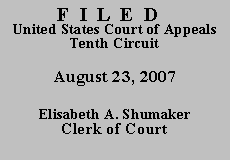

| ANSELMO A. CHAVEZ,
Plaintiff-Appellant, v. WILLIAM B. RICHARDSON, Defendant-Appellee. |
|
Mr. Chavez's claim relates to the Democratic primary election for the office of governor in New Mexico, which was held in June 2006. Defendant Richardson won the Democratic nomination in that election and also won the general election in November 2006. Mr. Chavez was a write-in candidate in the Democratic primary. He claims that, under New Mexico law, Mr. Richardson was not an eligible candidate in the primary because he signed his name on certain election-related forms as "Bill Richardson" rather than his full name of "William Blaine Richardson."
Mr. Chavez filed a pro se complaint in district court on December 15, 2006, seeking to set aside the Democratic primary nomination and the general election of Mr. Richardson, and asking that Mr. Chavez be named the winner of both elections. Alternatively, he sought an award of $440,000, which he claimed was equal to the New Mexico governor's compensation for four years. The district court issued an order to show cause why the case should not be dismissed for lack of subject-matter jurisdiction. Mr. Chavez responded, asserting that jurisdiction was proper under 28 U.S.C. 1331 because his complaint raised federal questions.
The district court dismissed the action, finding no jurisdiction under 1331 and also concluding that it lacked jurisdiction based on the Rooker-Feldman(1) doctrine, under which lower federal courts do not have jurisdiction to review "cases brought by state-court losers complaining of injuries caused by state-court judgments rendered before the district court proceedings commenced and inviting district court review and rejection of those judgments." Exxon Mobil Corp. v. Saudi Basic Indus. Corp., 544 U.S. 280, 284 (2005). In holding Rooker-Feldman applicable in this case, the district court found that Mr. Chavez had filed the same claim in New Mexico state court. His state-court complaint was dismissed, and the dismissal was affirmed on appeal by the New Mexico Supreme Court, before he filed his federal-court complaint. The district court concluded that Mr. Chavez sought, in his federal-court action, to overturn the New Mexico state-court rulings, and therefore the district court did not have jurisdiction. Mr. Chavez filed a timely appeal.
We review a district court's dismissal of a complaint for lack of subject-matter jurisdiction de novo. Mann v. Boatright, 477 F.3d 1140, 1145 (10th Cir. 2007). In his appeal brief, Mr. Chavez first argues the merits of his claim and then he repeats one of the bases for federal-question jurisdiction under 1331 that he asserted in the district court. But he does not address the district court's alternative ground for dismissal based on the Rooker-Feldman doctrine. Mr. Chavez has therefore waived his right to appeal that issue. See State Farm Fire & Cas. Co. v. Mhoon, 31 F.3d 979, 984 n.7 (10th Cir. 1994) (holding issue waived by appellant's failure to raise it in opening brief). Moreover, we need not address the remaining arguments Mr. Chavez makes on appeal because that issue, standing alone, was sufficient to divest the district court of jurisdiction. See Bones v. Honeywell Int'l, Inc., 366 F.3d 869, 877 (10th Cir. 2004) (applying waiver and upholding summary judgment on one of district court's alternative grounds which appellant failed to appeal); GFF Corp. v. Associated Wholesale Grocers, Inc., 130 F.3d 1381, 1387-88 (10th Cir. 1997) (same).(2)
The judgment of the district court is AFFIRMED.
Entered for the Court
Circuit Judge
*. After examining the briefs and appellate record, this panel has determined unanimously that oral argument would not materially assist the determination of this appeal. See Fed. R. App. P. 34(a)(2); 10th Cir. R. 34.1(G). The case is therefore ordered submitted without oral argument. This order and judgment is not binding precedent, except under the doctrines of law of the case, res judicata, and collateral estoppel. It may be cited, however, for its persuasive value consistent with Fed. R. App. P. 32.1 and 10th Cir. R. 32.1.
1. See Rooker v. Fidelity Trust Co., 263 U.S. 413 (1923), and D.C. Ct. of App. v. Feldman, 460 U.S. 462 (1983).
2. Even if Mr. Chavez had not waived his appeal of the district court's dismissal based on the Rooker-Feldman doctrine, we would affirm, finding no error in the district court's ruling on that issue.